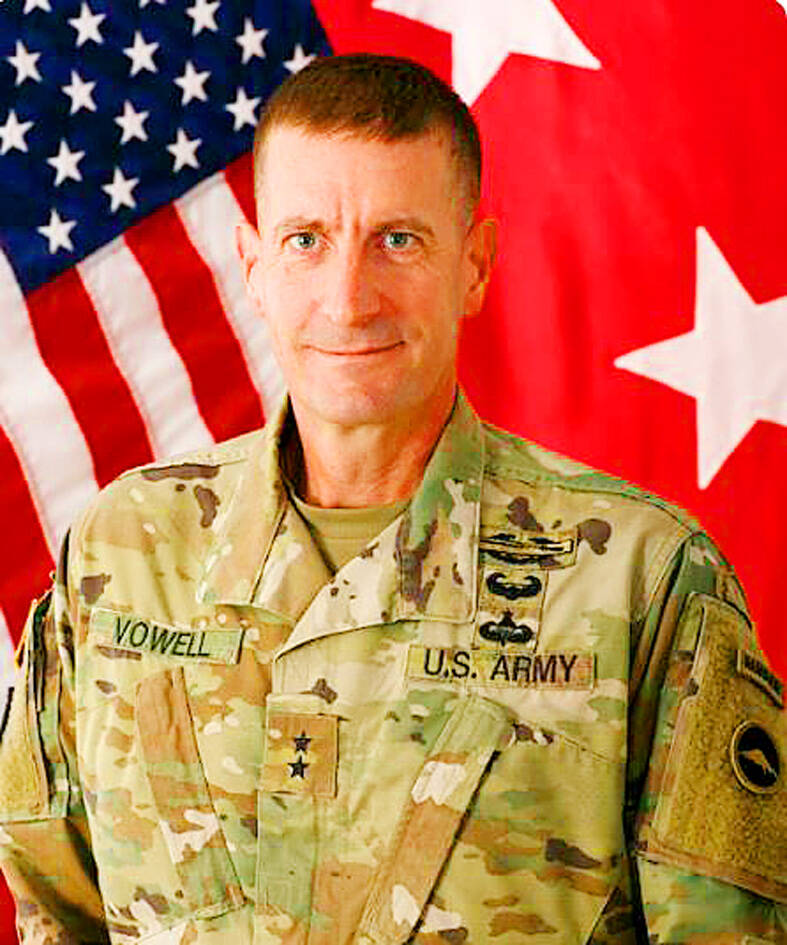US law prescribes that it provide training for the military systems it sells Taiwan, although its military assistance differs from that it has provided Ukraine, US Army Japan Commanding General Joel Vowell said on Thursday.
The US Army Japan stands in for the US Army with partners Taiwan, South Korea, Japan and the Philippines “on the knife edge of freedom” near authoritarian North Korea, Russia and China, Vowell told a virtual news briefing held by the US Department of State’s Asia-Pacific Media Hub on the US Army’s role in Japan and next month’s Land Forces Pacific Symposium and Exposition in Honolulu, Hawaii.
He began his remarks by showing a rotated “lid map” with continental Asia at the bottom, emphasizing the first island chain stretching from Russia to the South China Sea.

Photo: screen grab from the US-Asia Pacific Media Hub’s Twitter account
The US Army Japan’s role is to “provide crisis response options” for any threats in the region to assure allies and deter aggression, and to ensure interoperability with the Japanese military, he said.
Asked about reports that more than 200 US military personnel are stationed in Taiwan and the possibility of including the nation in joint drills, Vowell emphasized the legal component of the US-Taiwan military relationship.
“We’ve historically had a military and State Department presence through AIT [American Institute in Taiwan], and that’s generally been as required by law,” he said.
The US’ Taiwan Relations Act prescribes training to use the military systems purchased by Taiwan, he added.
For example, if the US sold a tank to Taiwan, it would send trainers — defense contractors or military personnel — to teach how to operate, shoot, move, communicate with and maintain it, Vowell said.
“That’s what the law prescribes us to do,” he added.
“Not recognizing Taiwan as a country is the United States policy and has been since the Taiwan Relations Act,” but the US military has been working with the State Department and the AIT to “make sure they understand a framework for a potential defense,” he said.
This is different from joint exercises with Ukraine in 2015, in which the US military trained Ukrainian regiments on tactical operations, he added.
In related news, a study last month showed that about half of Japanese believe the US would intervene if China were to invade Taiwan, while 61 percent said they were concerned about China’s territorial ambitions.
Published on March 29, the study jointly conducted by the Chicago Council on Global Affairs and the Japan Institute of International Affairs compared survey findings from December 2021 and September last year.
The survey last year showed that 52 percent of respondents said the US would intervene in an attack on Taiwan, down from 55 percent in 2021.
The share of participants who said they fear China’s territorial ambitions was similar to the 55 percent who in the 2021 survey saw China’s development into a world power as a critical threat to Japan, it said.
Asked the same question in another survey, 52 percent of Americans believed China’s territorial ambitions to be a critical threat.

EXPRESSING GRATITUDE: Without its Taiwanese partners which are ‘working around the clock,’ Nvidia could not meet AI demand, CEO Jensen Huang said Taiwan Semiconductor Manufacturing Co (TSMC, 台積電) and US-based artificial intelligence (AI) chip designer Nvidia Corp have partnered with each other on silicon photonics development, Nvidia founder and CEO Jensen Huang (黃仁勳) said. Speaking with reporters after he met with TSMC chairman C.C. Wei (魏哲家) in Taipei on Friday, Huang said his company was working with the world’s largest contract chipmaker on silicon photonics, but admitted it was unlikely for the cooperation to yield results any time soon, and both sides would need several years to achieve concrete outcomes. To have a stake in the silicon photonics supply chain, TSMC and

‘DETERRENT’: US national security adviser-designate Mike Waltz said that he wants to speed up deliveries of weapons purchased by Taiwan to deter threats from China US president-elect Donald Trump’s nominee for US secretary of defense, Pete Hegseth, affirmed his commitment to peace in the Taiwan Strait during his confirmation hearing in Washington on Tuesday. Hegseth called China “the most comprehensive and serious challenge to US national security” and said that he would aim to limit Beijing’s expansion in the Indo-Pacific region, Voice of America reported. He would also adhere to long-standing policies to prevent miscalculations, Hegseth added. The US Senate Armed Services Committee hearing was the first for a nominee of Trump’s incoming Cabinet, and questions mostly focused on whether he was fit for the

IDENTITY: Compared with other platforms, TikTok’s algorithm pushes a ‘disproportionately high ratio’ of pro-China content, a study has found Young Taiwanese are increasingly consuming Chinese content on TikTok, which is changing their views on identity and making them less resistant toward China, researchers and politicians were cited as saying by foreign media. Asked to suggest the best survival strategy for a small country facing a powerful neighbor, students at National Chia-Yi Girls’ Senior High School said “Taiwan must do everything to avoid provoking China into attacking it,” the Financial Times wrote on Friday. Young Taiwanese between the ages of 20 and 24 in the past were the group who most strongly espoused a Taiwanese identity, but that is no longer

A magnitude 6.4 earthquake and several aftershocks battered southern Taiwan early this morning, causing houses and roads to collapse and leaving dozens injured and 50 people isolated in their village. A total of 26 people were reported injured and sent to hospitals due to the earthquake as of late this morning, according to the latest Ministry of Health and Welfare figures. In Sising Village (西興) of Chiayi County's Dapu Township (大埔), the location of the quake's epicenter, severe damage was seen and roads entering the village were blocked, isolating about 50 villagers. Another eight people who were originally trapped inside buildings in Tainan